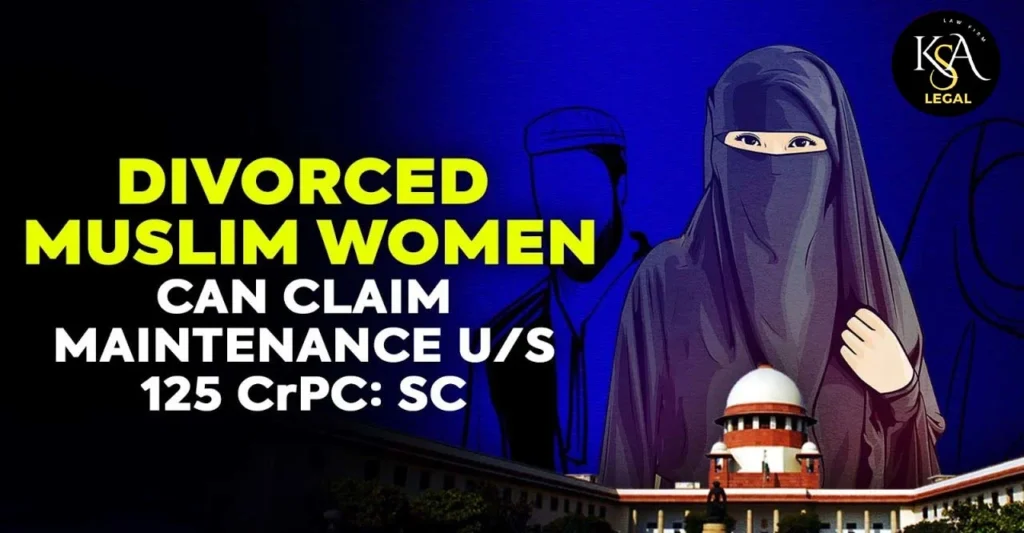
Divorced Muslim Woman Can Claim Maintenance Under CRPC And 1986 Act: Supreme Court(SC)
In a landmark judgment delivered on July 10, 2025, the Supreme Court of India held that a divorced Muslim woman is entitled to claim maintenance from her former husband under Section 125 of the Criminal Procedure Code (CrPC), in addition to the remedies available under the Muslim Women (Protection of Rights on Divorce) Act, 1986.
The ruling reinforces the principle of gender equality by ensuring access to maintenance under secular law, and clarifies that the provisions of Section 125 CrPC continue to apply to divorced Muslim women.
Case Background
The case stemmed from a petition filed by Mohd. Abdul Samad, who challenged an order directing him to pay interim maintenance to his divorced wife under Section 125 CrPC. The petitioner argued that since the 1986 Act is a special legislation governing the rights of divorced Muslim women, it overrides the applicability of Section 125 CrPC in such cases.
However, a Bench comprising Justices B.V. Nagarathna and Augustine George Masih rejected this contention. The Court held that both statutes operate independently and can coexist harmoniously, with neither negating the other. The bench upheld the constitutional validity of providing maintenance under CrPC, affirming that divorced Muslim women have the right to seek relief under both legal frameworks.
This decision marks a significant step in reinforcing access to justice and financial security for Muslim women post-divorce, aligning with constitutional guarantees of equality and dignity.
Learn About: Divorce Lawyer in Delhi
Key Findings of the Supreme Court on Maintenance Rights of Divorced Muslim Women
In its landmark decision, the Supreme Court of India, through separate but concurring opinions delivered by Justices B.V. Nagarathna and Augustine George Masih, laid down the following key legal principles:
- Applicability of Section 125 CrPC / Section 144 BNSS
- Section 125 of the Code of Criminal Procedure (CrPC) – now paralleled by Section 144 of the Bharatiya Nagarik Suraksha Sanhita (BNSS) – is a secular provision intended to provide maintenance to all women, regardless of religion.
- The Court clarified that this provision applies equally to married and divorced Muslim women and is not overridden or excluded by the Muslim Women (Protection of Rights on Divorce) Act, 1986.
- Muslim women divorced either under Muslim personal law or the Special Marriage Act are entitled to seek maintenance under both the CrPC/BNSS and the 1986 Act, as independent and additional remedies.
- Choice of Legal Remedy
- A divorced Muslim woman has the right to choose whether to claim maintenance under:
- The 1986 Act,
- Section 125 CrPC / Section 144 BNSS,
- Or both provisions, depending on her situation.
- The Court firmly held that Section 3 of the 1986 Act, despite containing a non-obstante clause, does not bar or negate the applicability of Section 125 CrPC. Both can operate concurrently.
- Doctrine of Harmonious Construction
- Justice Masih emphasized that the rights granted under Section 125 CrPC/144 BNSS and those under Section 3 of the 1986 Act operate in distinct legal spheres and can peacefully coexist without conflict.
- Justice Nagarathna cautioned against interpreting the 1986 Act as a complete substitute for CrPC remedies, stating that such a view would be regressive and inconsistent with the constitutional mandate of equality and dignity.
- Triple Talaq and Maintenance Rights
- Addressing the issue of instant triple talaq, which has already been declared unconstitutional, the Court held that a Muslim woman subjected to such a divorce continues to have the right to claim maintenance under Section 125 CrPC/144 BNSS.
- Justice Nagarathna noted that since triple talaq is invalid in law, the marriage is not legally dissolved, and thus the woman retains her right to maintenance.
This ruling not only upholds the secular and inclusive character of Indian maintenance laws but also reinforces the constitutional values of gender justice and equality, ensuring that Muslim women are not left without recourse under the guise of personal laws.
Learn About: Bail Lawyer in Delhi
Rejection of the Petitioner’s Arguments
In challenging the applicability of Section 125 CrPC to a divorced Muslim woman, Senior Advocate S. Wasim A. Qadri, appearing for the petitioner, argued that the Muslim Women (Protection of Rights on Divorce) Act, 1986 should take precedence as a special law. The counsel contended that:
- The CrPC should be overridden by the 1986 Act, which is a specific legislation dealing exclusively with the rights of divorced Muslim women.
- The Act provides a comprehensive mechanism for dealing with issues such as mehr, dower, and fair provision beyond the iddat period.
- Section 5 of the Act, which allows parties to opt for CrPC remedies only upon mutual consent, implies an intent to exclude CrPC by default.
However, the Supreme Court unequivocally rejected these arguments, holding that:
- The 1986 Act is not a complete legal code that overrides or repeals Section 125 CrPC. Both can function concurrently.
- Section 5 of the Act is applicable only when proceedings are initiated under the 1986 Act – a condition not met in the present case.
- There is no express exclusion clause within the 1986 Act that bars the application of CrPC. In the absence of such clear legislative intent, CrPC remains applicable.
Submissions by the Amicus Curiae
Senior Advocate Gaurav Agarwal, acting as amicus curiae, supported the respondent woman’s claim for maintenance under Section 125 CrPC. He provided a broader interpretative framework, stating:
- The 1986 Act codifies aspects of Muslim personal law, particularly in relation to maintenance and fair provision. While it may extend maintenance rights beyond the iddat period, it does not curtail or exclude the remedy available under the CrPC.
- Section 7 of the Act, being a transitional provision, governs pending proceedings at the time the Act was enacted. It does not prevent new applications under the CrPC.
- A divorced Muslim woman should not be compelled to elect between one statutory remedy and another. The legislative intent is to leave both avenues open, allowing women to invoke either or both depending on the circumstances.
Constitutional Perspective and the Court’s Stand
From a constitutional standpoint, the Supreme Court underscored that denying Muslim women access to maintenance under Section 125 CrPC would violate their fundamental rights under Article 14 (equality before law) and Article 15(1) (prohibition of discrimination on grounds of religion or sex) of the Constitution.
The Court stressed the importance of applying uniform secular laws in areas where personal law is either silent, ambiguous, or insufficient to protect the rights of women. The ruling reinforces the idea that secular provisions of maintenance law are meant to serve as a social justice tool, ensuring no woman is left without remedy due to her religion or marital status.
Supreme Court’s Observations on Section 127(3)(b) CrPC
In its detailed analysis, the Supreme Court clarified the role of Section 127(3)(b) of the Criminal Procedure Code, which pertains to the modification of maintenance orders. The Court held that when a divorced Muslim woman is already receiving maintenance under the Muslim Women (Protection of Rights on Divorce) Act, 1986, the Magistrate must take this into account while issuing or revising maintenance orders under Section 125 CrPC (or Section 144 BNSS, its updated equivalent).
This interpretation ensures that maintenance is neither duplicated nor denied, while reinforcing that the 1986 Act does not act as a bar to claims made under the CrPC. Instead, it functions as an additional remedy, offering Muslim women parallel avenues for relief.
The ruling significantly enhances the legal standing of divorced Muslim women, reaffirming their right to claim maintenance through secular provisions. By harmonizing the application of personal and secular laws, the Court has taken a crucial step toward advancing women’s empowerment and promoting legal uniformity in matters of maintenance, dignity, and social welfare.
Karuna Sharma & Associates is your trusted one-stop legal platform, offering a comprehensive repository of legal resources, updates on recent judgments, and access to qualified legal professionals. Whether you need expert guidance on family law, criminal law, or civil disputes, the experienced lawyers at Karuna Sharma & Associates are equipped to provide personalized online legal consultations to meet your specific needs.
Email: adv@karunasharma.com
Help Desk: +91-84100-00037
